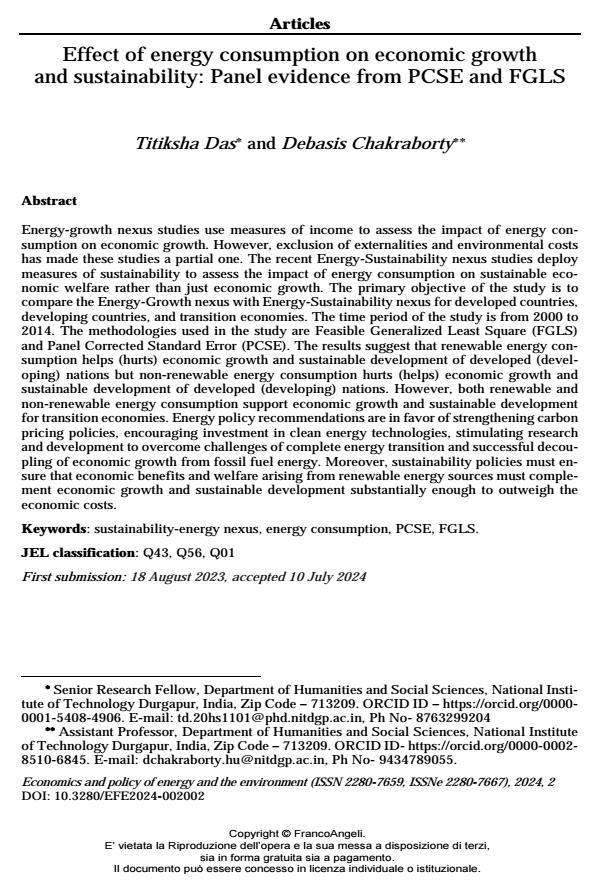Effect of energy consumption on economic growth and sustainability: Panel evidence from PCSE and FGLS
Titolo Rivista ECONOMICS AND POLICY OF ENERGY AND THE ENVIRONMENT
Autori/Curatori Titiksha Das, Debasis Chakraborty
Anno di pubblicazione 2024 Fascicolo 2024/2
Lingua Inglese Numero pagine 17 P. 37-53 Dimensione file 160 KB
DOI 10.3280/EFE2024-002002
Il DOI è il codice a barre della proprietà intellettuale: per saperne di più
clicca qui
Qui sotto puoi vedere in anteprima la prima pagina di questo articolo.
Se questo articolo ti interessa, lo puoi acquistare (e scaricare in formato pdf) seguendo le facili indicazioni per acquistare il download credit. Acquista Download Credits per scaricare questo Articolo in formato PDF

FrancoAngeli è membro della Publishers International Linking Association, Inc (PILA), associazione indipendente e non profit per facilitare (attraverso i servizi tecnologici implementati da CrossRef.org) l’accesso degli studiosi ai contenuti digitali nelle pubblicazioni professionali e scientifiche.
Energy-growth nexus studies use measures of income to assess the impact of energy consumption on economic growth. However, exclusion of externalities and environmental costs has made these studies a partial one. The recent Energy-Sustainability nexus studies deploy measures of sustainability to assess the impact of energy consumption on sustainable economic welfare rather than just economic growth. The primary objective of the study is to compare the Energy-Growth nexus with Energy-Sustainability nexus for developed countries, developing countries, and transition economies. The time period of the study is from 2000 to 2014. The methodologies used in the study are Feasible Generalized Least Square (FGLS) and Panel Corrected Standard Error (PCSE). The results suggest that renewable energy consumption helps (hurts) economic growth and sustainable development of developed (developing) nations but non-renewable energy consumption hurts (helps) economic growth and sustainable development of developed (developing) nations. However, both renewable and non-renewable energy consumption support economic growth and sustainable development for transition economies. Energy policy recommendations are in favor of strengthening carbon pricing policies, encouraging investment in clean energy technologies, stimulating research and development to overcome challenges of complete energy transition and successful decoupling of economic growth from fossil fuel energy. Moreover, sustainability policies must ensure that economic benefits and welfare arising from renewable energy sources must complement economic growth and sustainable development substantially enough to outweigh the economic costs.
Parole chiave:sustainability-energy nexus, energy consumption, PCSE, FGLS.
Jel codes:Q43, Q56, Q01
Titiksha Das, Debasis Chakraborty, Effect of energy consumption on economic growth and sustainability: Panel evidence from PCSE and FGLS in "ECONOMICS AND POLICY OF ENERGY AND THE ENVIRONMENT" 2/2024, pp 37-53, DOI: 10.3280/EFE2024-002002